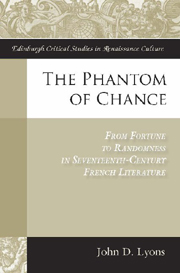Book contents
- Frontmatter
- Contents
- Preface: The Phantom of Chance
- Acknowledgements
- Series Editor's Preface
- Introduction
- 1 Fortune, Mistress of Events: Corneille and the Poetics of Tragedy
- 2 God in a World of Chance: Pascal's Pensées and Provincial Letters
- 3 From Chance Events to Implausible Actions: Lafayette and the Novel
- 4 The God of Suspense: Bossuet's Providential History and Racine's Athalie
- 5 An Accidental World: La Bruyère's Characters
- Conclusion
- Bibliography
- Index
1 - Fortune, Mistress of Events: Corneille and the Poetics of Tragedy
Published online by Cambridge University Press: 12 September 2012
- Frontmatter
- Contents
- Preface: The Phantom of Chance
- Acknowledgements
- Series Editor's Preface
- Introduction
- 1 Fortune, Mistress of Events: Corneille and the Poetics of Tragedy
- 2 God in a World of Chance: Pascal's Pensées and Provincial Letters
- 3 From Chance Events to Implausible Actions: Lafayette and the Novel
- 4 The God of Suspense: Bossuet's Providential History and Racine's Athalie
- 5 An Accidental World: La Bruyère's Characters
- Conclusion
- Bibliography
- Index
Summary
Chance as Cornerstone of Poetics
It seems unlikely that Le Cid, which has been described as ‘our first true classic tragedy’ in a tradition emphatically marked by ‘a confidence in human power and authority’ and written by an author known for ‘confining the action of the play to a conflict between passion and duty’, would give chance a significant role. Yet when Corneille reflected on several decades of writing for the theatre in the sparkling commentary known as the Three Discourses on the Dramatic Poem he did not choose to start with passion, duty, power or authority, but rather with an assertion of the importance of chance. In the first paragraph, which begins with the aggressively polemical assertion that pleasure alone is the goal of tragedy, Corneille also makes this ringing declaration about the primacy of chance:
Our Doctor says that the Subjects come from Fortune, which makes things happen, and not from Art which imagines them. She is the mistress of Events, and in giving us a choice from among those she presents to us, she implicitly forbids the usurpation by which we would put on the Stage incidents not of her making.
Corneille's purpose in paraphrasing Aristotle here is clearly to launch a sustained assault on the orthodoxy of his day that tragic stories should be essentially plausible. He seeks a foundation in the Poetics by locating one of the three passages in which Aristotle writes of chance.
- Type
- Chapter
- Information
- The Phantom of ChanceFrom Fortune to Randomness in Seventeenth-Century French Literature, pp. 30 - 66Publisher: Edinburgh University PressPrint publication year: 2011



